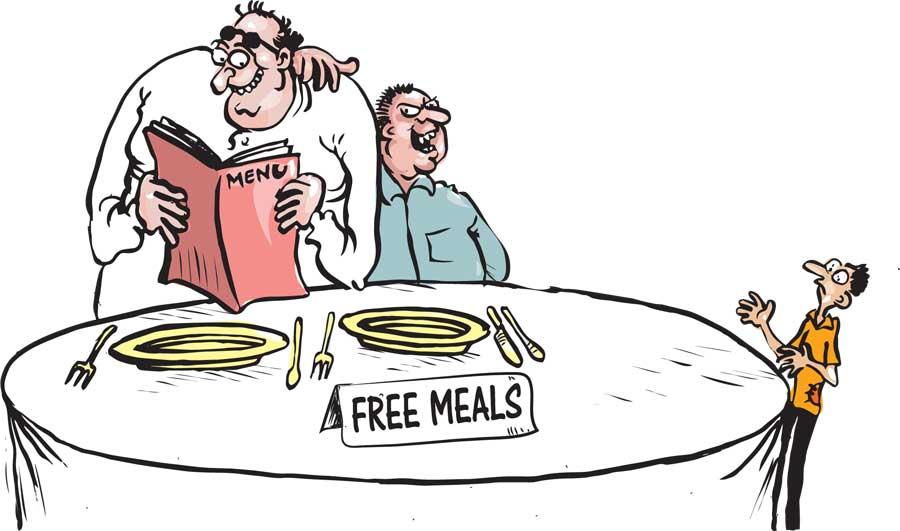Reply To:
Name - Reply Comment

Just a few days ago we read in the newspapers that the All Island Canteen Owners’ Association (AICOA) President had stated that no one should be given free meals and that those ‘demanding’ free meals must be dealt with severely.
According to the newspaper report a popular artiste had got into an argument at an eatery and attempted to leave the place without settling the bill. AICOA President was later quoted in newspapers sending a warning to all association members that no one should be served with free meals; he had provided a list of those who shouldn’t be served with free meals and it contained references to politicians, state officers, police officers, public health officers and consumer affairs officers.
This culture of serving free meals or going a step further and providing charity to the less fortunate must be checked. A recent government study on Samurdhi and its beneficiaries had proven that though this programme had been initiated to alleviate poverty it had not been successful. The present government has already started working on an alternate plan. This has given rise to the Aswesuma programme which the state commenced this month (July).
The problem Sri Lanka faces is to identify those who are genuinely in need of state aid. There are people who have enough, but don’t get exposed in the government initiated screening process. They fall into the category laymen commonly call the poorest of the poor and quite ridiculously at that! The regime now believes that the introduction of the Aswesuma programme will not only eradicate poverty to some extent it will also eliminate those who don’t deserve government welfare from the list of the needy.
Lawmakers of this country must set the tone for this initiative. They must be brave and serve the people to help them climb a few rungs in the social ladder. Lawmakers must work towards ensuring at least the third generation of citizens moves out of poverty.
Though the state wants to find those who are truly in need of welfare and make their lives better there are a good number of politicians who are also aware that come election time it’s those who don’t have that can be manipulated for votes and benefits. The Aswesuma programme is initiated by President Wickremesinghe. And what’s good about this new programme is that it was introduced to the public by a lawmaker who at this stage of his political career doesn’t need the support of the public; in other words voters. Hence if he fancies he can initiate a culture where politicians start eliminating from the list of the needy individuals who are not really in need.
When the Welfare Benefit Board initiated applications for the Aswesuma programme it received 3.7 million submissions. The government has warned that as a result of the new initiative some Samurdhi recipients may be knocked off from the list of government beneficiaries. This could largely be because new surveys may expose those who are not so genuine about their financial position in life.
The number of submissions mentioned here as a figure can be used to lift the country and its people or for manipulating purposes. There are lawmakers who have ‘helped’ people in their area for as many as three generations. This doesn’t state much about the efforts taken by people-especially the third generation- in these areas to escape from the clutches of ‘slavery’, poverty and the grip of politicians. Many years ago, which was before 1977, there was the ‘rice provision book’ and people depended on lawmakers and promised them votes in return of welfare measures taken by the government. But if one considers the post 1988 period up to 1993 –the time when R. Premadasa was president-people voted for this lawmaker and his ‘Green’ party out of gratitude because in a few years time they had moved out of extreme poverty; thanks to government’s development and economic programmes. Of course Premadasa had the Janasaviya programme for the less fortunate.
Critics affirm that this regime must slash government benefits as much as possible. Every cent must be accounted for. In short people mustn’t be given free fish. They must be taught the art of catching fish!